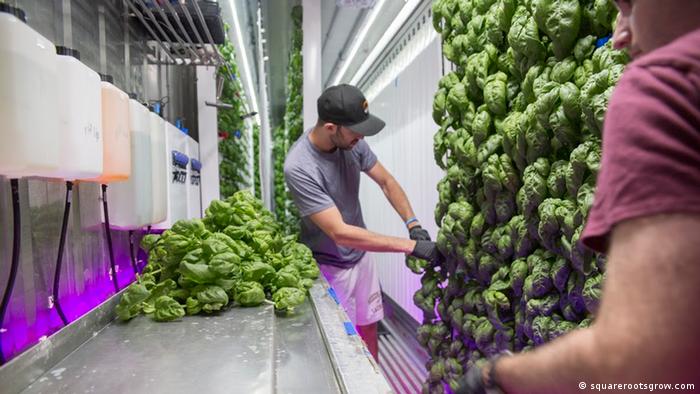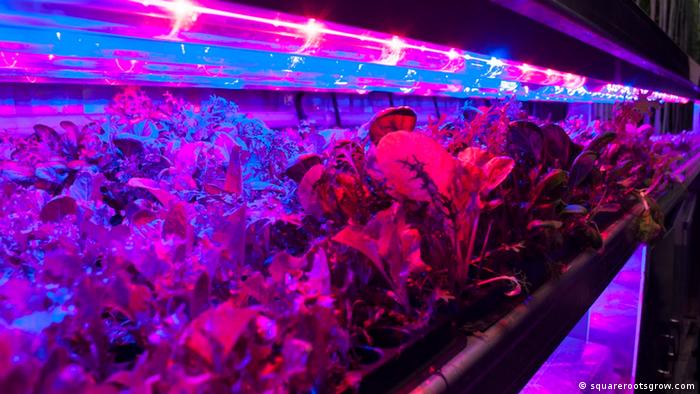To supply the world’s growing population with food is becoming more and more difficult. In New York entrepreneurs are working on Alternatives. From there, Sophie Schimansky reported.

Tobias Peggs is wearing black Nikes, dark Jeans and a black Shirt. He hops to the back row of the audience to see. About 60 New York sun glasses, Sneakers, shoulder bags to carry and are armed with Smartphones. The group has met on a Parking lot in Brooklyn, New York.
Peggs asks everyone to whip out the Smartphones and announces: “Now I’ll show you a Farm.” Then he pulls the heavy doors of a container. Visible a kind of large Terrarium. Therein, the pink light and many of the green leaves of cultivated plants. In the glass of the opposite warehouse is reflected in bright White, a former building of the pharmaceutical company Pfizer, one of the world’s largest manufacturers of chemicals for Fertilizing and spraying of fields. “We could have no better place to imagine our modern Farm,” says Peggs and grins.
Vegetables with High-Tech help
Square Roots is a Farm in the middle of the city. In ten snow-white containers Farmer pulling Basil, lettuce and mint. You rent the Container of Square Roots for 1200 dollars a month and sell their crops to supermarkets and Restaurants. The Mission: leaf vegetables in a space-saving and resource-conserving grow mainly where it is needed: In large cities, which are often miles away from the nearest farm.
Founder Tobias Peggs has a prominent Partner and co-founder: Kimbal Musk, brother of Tesla CEO Elon Musk. At a conference of the series of Ted Talk in August 2015, in Memphis, Kimbal, Musk said, he saw herein a Chance of “real” food to grow “food that is healthy for consumers, the planet and economically viable for the farmers.”
Where the brothers Musk are involved, is High-Tech not that far – and so also, the container farms real technology wonder. The Smartphone allows for an efficient use of resources. An App that monitors the temperature, CO2 content, humidity. And, if necessary, then sends an Alarm to the Farmer.

Against the exploitation of nature
Traditional agriculture is, as yet, unrivalled. But the environment suffers. According to the OECD, agriculture consumes 70 percent of available water worldwide, and contributes significantly to their contamination with pesticides. Agriculture is responsible for up to a third of the greenhouse gases.
This is doubly dangerous, because at the same time worldwide are cut down constantly forests to gain arable land. Moreover, long transportation routes, with additional emissions.
This is exploitation of nature, says Jonathan Foley, who has worked as a scientist and a writer with the influence of agriculture on the environment. Humanity is facing one of the biggest challenge ever. Nine billion people need to be fed, and without destroying the planet. “We only have the one attempt, and got to work.”

More and more people need to be fed
Because the world population is growing inexorably. The United Nations estimate that you will be at the end of this century, at 11.2 billion – currently there are 7.5 billion people. But it is already one of nine people are undernourished, estimates the UN. And, although mankind exploits the planet already literally.
The result, warns the Director of the UN entity for food and agriculture, José Graziano da Silva, was that the planetary boundaries are exceeded, in particular if nothing changes. With this change, some entrepreneurs feverishly to work. In America, Urban farms are springing up like mushrooms out of the ground. You are in the city, reduce transport distances and cultivate food resources and space-saving.
Companies such as Square Roots, AeroFarms and Fenway Farms try to new models. The plants are not grown side by side on huge fields, but vertically stacked. Thus, less space is consumed. The water circulates, instead of once a shed. A Container is consumed as the day, slightly more than 30 litres – about half as much as an American, on average, a shower uses. The transport paths are short, because the farms are located in the cities.
The editorial recommends
Cities as self-catering?
Nine billion people will live in 2050 on earth – two thirds of them in the cities. All of these city-dwellers have to be food – sustainable, close to town and reasonably priced. (16.10.2016)
Digitized Agriculture
Farmers use it on fields and in their animals, computer data, in order to optimize the agriculture. With “Precision Farming” do you want to save money and at the same time protect the environment. (12.10.2015)
Fish and tomatoes from the urban farm
A Berlin-based Start-Up company to produce environment – and climate-friendly food for the city. Fish breeding and cultivation of organic Vegetables are intelligently combined, it could be the way of the future for the world’s food supply. (19.03.2015)
Vertical Farming
By 2050 more than 9 billion people will live on the earth. The existing area of arable land is not enough to feed the world’s population. The solution could be Vertical to bring Farming: greenhouse-skyscrapers. (01.06.2012)
This could be just the beginning
There are many opponents of this approach. And you have valid arguments, because the urban Farmer does not have a solution for everything. Since you don’t rely on the sun as a source of natural light, you need artificial light. Blue and red LEDs supply the plants with everything that they need for photosynthesis. The LEDs and air-conditioning systems, however, need one thing above all: a lot of electricity. A Container is consumed on day 90 kilowatt-hours of electricity. In the case of a New York price of Electricity would be charged the monthly $ 600 up. “There is no doubt that the entire industry must still work.”, Peggs says.
The energy-intensive Ökocontainer fall back on electricity produced from fossil fuels. Another point of criticism: so Far, only the leaf is often a vegetable in the cultivation. Vegetables and fruits are in need of even more energy. To supply the world with the salad, not, rich says, for example, Stan Cox of the nonprofit research organization the land Institute. He supported that vegetables would be grown in cities, but “we will have to grow most of our food with the earth and the sun on fields, as it always was.”
Urban farms are still in their infancy, the operators know. But it is also well known that agriculture is afflicting our planet. Urban farms are, at the moment the only Alternative. And if Musk has his fingers in the game, is a lot of things possible: Kimbals brother Elon shoots, finally, meanwhile, the rockets into space and is the founder of the most successful electric car brand in the world.